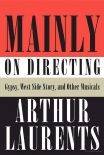Mainly on Directing Arthur Laurents (best ereader for epub .TXT) 📖

- Author: Arthur Laurents
Book online «Mainly on Directing Arthur Laurents (best ereader for epub .TXT) 📖». Author Arthur Laurents
Jerry refused to put Gypsy into rehearsal until he had a box around his name. My contract called for equal billing. Stalemate. Solved by Merrick giving me an extraordinarily larger royalty—which really was paid by Leland Hayward, not Merrick. Once he had won the battle for the box, Jerry set about exercising the power now firmly in his directorial hands and Merrick set about trying to disabuse him of the belief that he had that power. If Leland Hay-ward had a function, it was to protect Jerry, but he wasn't around enough to do it. He and his glam wife, Slim Hawks, wafted in and out of rehearsals on their way to and from the Colony Club, and then to and from wherever the beautiful people drank their martinis dry in Philadelphia. They were good for morale, though: they adored whatever they saw when they were in the theatre.
Merrick was bad for morale, which made him feel good. His curious belief was that a producer gets the best out of author and director if he can set them at each other's throats like Rottweilers. The box-around-the-name dust-up provided him with his antagonists: Jerry and me.
Merrick's shenanigans struck me as funny. He prowled the back of the New Amsterdam roof in New York, where we rehearsed, and the back of the Shubert in Philadelphia, where we tried out, constantly muttering that the director was killing the golden goose. “Turkey lurkey!” he warned, making me laugh and making him wonder why I was laughing. He made a daily pit stop to needle me with variations on one theme: Jerry might be a great choreographer, but this was a book show; Jerry couldn't direct his way out of a paper bag and was ruining my show.
He himself believed his dire predictions for Gypsy: the show had Robbins cancer, he had seen the X rays, the odds were against survival. Because Merman's last show, Happy Hunting, had been a flop, there was no life at the box office in New York, only a minimal advance, which the discouraging word heard from Philadelphia hadn't increased. Unless we got really good reviews, he confided, we'd close in three weeks. And considering the mess Jerry was making, close in three weeks he was certain we would.
“If you really believe that,” I goaded, “why don't you sell your share to Leland and get out?”
He mulled that over for less than two seconds, then smiled. He was agreeable. Leland was more than agreeable. The deal was made, but a deal with David Merrick was a David Merrick deal, which meant it was open ended.
Opening night in New York, it was he, not Leland, who came over to my table at Sardi's, holding out the New York Herald Tribune review with Walter Kerr's famous opening line, “The best damn musical I've seen in years!” “This is for you,” he smiled, happier than I'd ever seen him. But the review was for his show. He had waited and had never signed the deal. In every sense, Gypsy was a David Merrick production.
Leland took it with grace and good humor. At heart, he wasn't really a producer. He married famous, classy ladies and he had his table at the very classy Colony, but his business was his roster of famous, classy clients. Basically, Leland Hayward was an agent. David Merrick was a producer. His life was producing; he loved producing, he loved theatre. Today, there is a desperate need for producers who really love theatre as theatre, not for what it can do for them and their investors. David Merrick, of the slippery reputation and the slipping toupee, really loved theatre. He understood that there were two basic kinds and he produced each under a different rubric: the commercial Hello, Dolly! was produced by David Merrick; the artistic Marat/Sade was produced by his Foundation. What is surprising and encouraging is that his artistic ventures had a much higher percentage of success than his commercial ones. But it was the commercial successes that made the big money that enabled him to take risks, and he was always ready to take them.
That was why I persuaded Steve Sondheim that we bring our unconventional Anyone Can Whistle to Merrick. David was hardly blind to what the show was. He wasn't afraid of it or of me directing as well as writing (anathema to producers, ignoring the history of the theatre), but he believed it called for unconventional producing. A smaller theatre—the Royale, as the Bernard B. Jacobs was called then, rather than the usual big musical house like the Majestic (where it ended up, literally)—and a smaller orchestra, sixteen rather than the usual twenty-odd. That was for starters. His objective was to lower production and running costs so that he would have extra money to promote the show after the mixed reviews he was certain it would get. To me, as director more than as author, this made eminent sense. To Steve, this was just an everyday household word I am still waiting to appear in the New York Times: bullshit. He believed Merrick didn't like his score and didn't want to give him the full orchestra he wanted. So the authors rejected Merrick: “You can't fire us, we quit,” as Steve saw it. I





Comments (0)